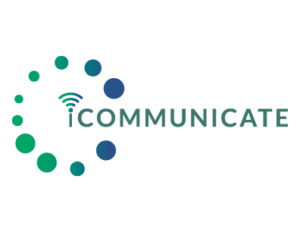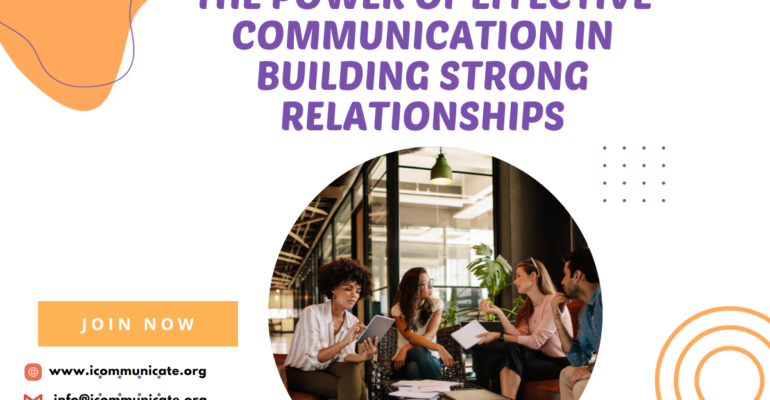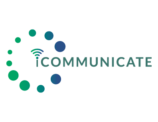THE POWER OF EFFECTIVE COMMUNICATION IN BUILDING STRONG RELATIONSHIPS
December 5, 2023 2023-12-05 20:19THE POWER OF EFFECTIVE COMMUNICATION IN BUILDING STRONG RELATIONSHIPS
Effective communication is crucial in connecting and relaying concerns responsibly and respectfully. Relationships are built on personal interactions rather than on paper or in digital domains. This blog focuses on the intricacies of communication in a complex world, highlighting how the right words, when spoken, can open doors, build bridges, and establish long-lasting relationships. It delves into the art of effective communication, a skill that can transform ordinary interactions into meaningful connections, ethical partnerships, and compassionate problem-solving.
Understanding the Essence of Effective Communication
The essence of communication dwells in our interpersonal relationships. It is about social awareness, emotional intelligence, and the commitment to sustain affinity when disagreeing. At the heart of effective communication lies a transformative power that stands on the premise that there is nothing that can’t be resolved when we communicate. Therefore, communication goes beyond the surface, tapping into emotions and thoughts, making it a source of power and connection. It’s about listening actively, speaking authentically, and resonating more deeply with your audience.
Historical Perspectives on Effective Communication
Historical perspectives in communication reveal a fascinating evolution, reflecting societies’ changing needs, technologies, and philosophies over time. Here are some critical historical perspectives:
- Ancient Rhetoric and Oratory: In ancient Greece and Rome, rhetoric and oratory were vital arts. Figures like Aristotle, who wrote “Rhetoric,” and Cicero, a renowned Roman orator, exemplified the power of persuasive speech. Their work laid the foundations for public speaking and argumentation, emphasizing the importance of ethos (character), pathos (emotion), and logos (logic).
- The Written Word: The invention of writing systems, from cuneiform in ancient Mesopotamia to hieroglyphics in Egypt, marked a significant leap in communication. This allowed for the recording and preserving of knowledge, laws, and stories, which could be shared across time and space.
- The Printing Revolution: Johannes Gutenberg’s invention of the movable type printing press in the 15th century revolutionized communication. It enabled the mass production of books and other texts, facilitating the spread of knowledge, ideas, and literacy. This had profound effects on education, religion, and society at large.
- The Telegraph and Telephone: The 19th century brought about the telegraph and telephone, inventions that transformed long-distance communication. The telegraph, developed by Samuel Morse and others, allowed messages to be sent over vast distances almost instantaneously. Alexander Graham Bell’s telephone later added the dimension of voice, making communication more personal and immediate.
- Radio and Television: The 20th century saw the advent of radio and television, which brought audio and visual communication into homes worldwide. These media became primary sources of entertainment, news, and cultural exchange, dramatically influencing public opinion and societal trends.
Each of these eras contributed significantly to the evolution of communication, shaping how societies interact, share knowledge, and understand each other. These historical perspectives highlight man’s profound desire to connect, belong, and bring about change in the world.
The Importance of Building Strong Relationships
The digital revolution has defined and shaped the modern world. The internet, social media, and mobile technology have created a hyper-connected world. This era is characterized by the rapid exchange of information, the democratization of content creation, and new communication norms and challenges, such as managing digital privacy and the proliferation of misinformation.
In today’s interconnected world, it’s crucial to build strong relationships. Communication is the key to sharing the world we live in, and we need to strike a balance between digital tools and human interaction. While digital tools can enhance our goals and objectives, they cannot replace building mutual respect, understanding, or collaboration. We must remember that relationships form the foundation of thriving societies and provide individuals meaning and purpose.
Components of Effective Communication
Effective communication is comprised of several key components, including intention, active listening, and compassion. Intention is the ability to express your ideas and thoughts clearly and purposefully. Active listening involves prioritizing listening over speaking and trying to truly understand what the other person is saying without jumping to conclusions or preparing a response while they are still speaking. Compassion is also an essential component of effective communication, as it involves approaching a conversation with an open mind and a willingness to understand the other person’s perspective without judgment or preconceived notions.
Communication Tools and Strategies
Effective communication is crucial in all aspects of life, from personal relationships to professional interactions. It plays a vital role in unlocking professional growth. Here are some essential communication tools and strategies that can enhance the way we connect and collaborate with others:
Feedback: Provide constructive feedback and also be open to receiving feedback. This two-way feedback process is essential for effective communication and continuous improvement.
Public Speaking Skills: Develop your public speaking skills to effectively convey your ideas to larger audiences. This includes working on your voice modulation, pacing, and audience engagement techniques.
Storytelling: Use storytelling to make your communication more engaging and memorable. Stories can help illustrate complex ideas in a relatable way.
Technology Aids: Use tools like presentation software, project management apps, and communication platforms (like Slack, Zoom, or Microsoft Teams) to enhance your communication in virtual settings.
Cultural Sensitivity: Be aware of and respectful of cultural differences in communication styles. This is particularly important in diverse and globalized work environments.
Questioning Techniques: Use open-ended questions to encourage discussion and closed questions to obtain specific information. Good questioning can stimulate more in-depth thinking and understanding.
Personalized Communication: Tailor your communication style to your audience. Different situations and people may require different approaches.
Integrating these tools and strategies into your daily interactions can enhance your communication ability, build stronger relationships, and achieve better outcomes in both personal and professional settings.
Conclusion
Effective communication is not just a form of art; it is a fundamental skill that holds the power to change lives and shape futures. Let us pledge to master this skill to develop stronger relationships and create a better world. The journey commences with you – are you willing to transform your communication and, subsequently, your relationships? Let’s embark on this path together towards a rich world of understanding and human connection.


